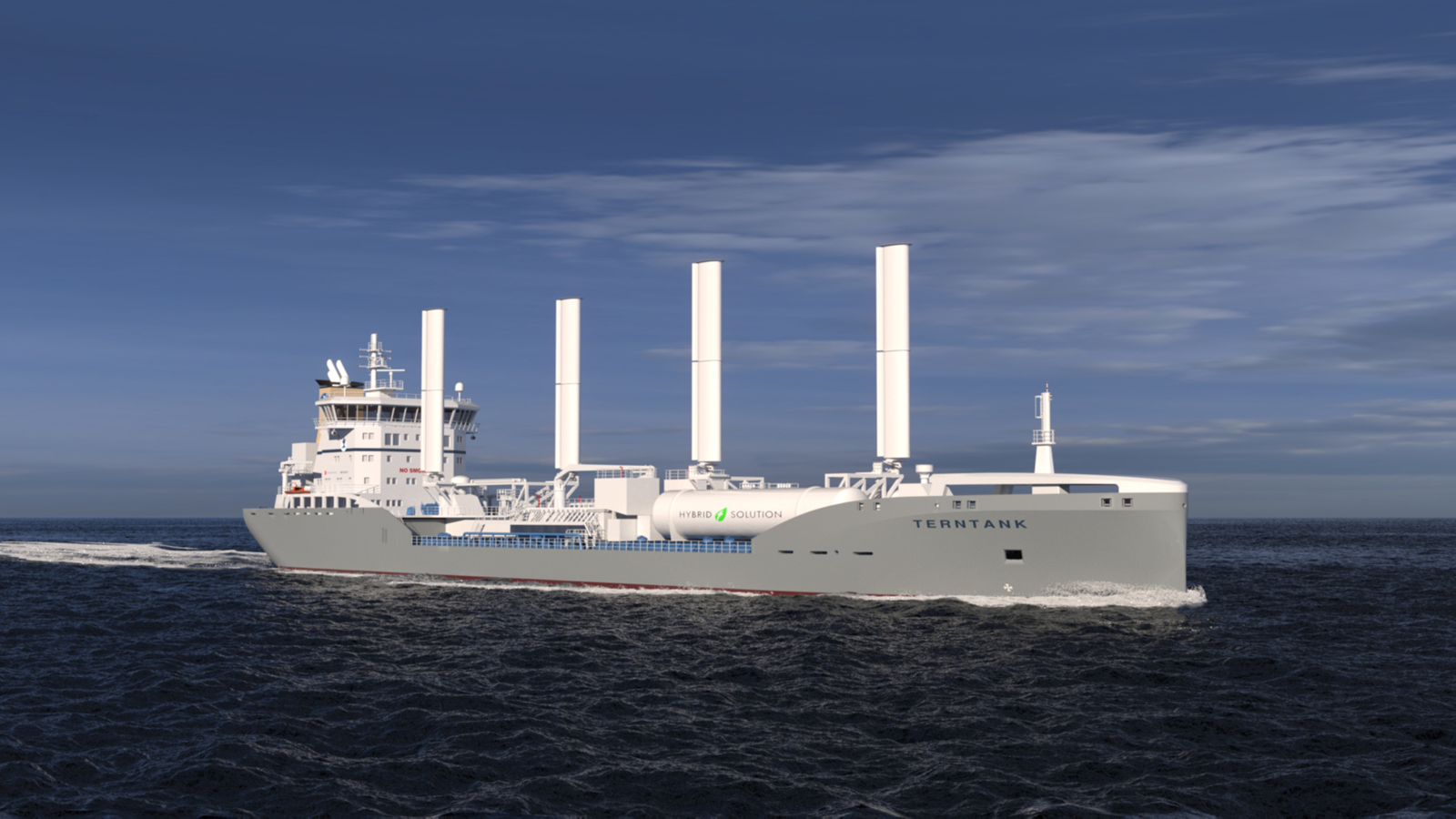
The latest cargo ships will use Kongsberg Maritime technology to maximise efficiency and save fuel while cutting emissions and providing a safe, comfortable workplace.
-
Text:Global Sales and Marketing
Photo:©Kongsberg Maritime
-
Craig TaylorSenior Manager PR & Communications
Kongsberg Maritime is taking a leading role in the development of the next generation of cargo ships through the cutting-edge technologies it has developed for its new 15,000 DWT low-emission, hybrid fuel-powered chemical tanker design.
The company has won orders for 11 ships from Danish tanker operator Terntank and, at the end of 2023, secured a further contract for two ships from Swedish tanker operator, Sirius Rederi AB.
The first batch of three tankers for Terntank is being built at the China Merchants Jinling Shipyard in Yangzhou and will be delivered in 2025. The design concept, which also features wind-assist technology, won the prestigious Nor-Shipping Next Generation Ship Award in 2023.
As part of the contract for Sirius Rederi, Kongsberg Maritime will supply two MGO/biofuel and methanol-ready chemical tankers with a comprehensive suite of equipment. This includes steering gear, Promas with flap rudder and CPP, tunnel thruster with M-con thruster control system, K-Chief integrated automation systems, AutoChief Propulsion Control System and deck machinery. The vessels will feature a state-of-the-art hull design – the NVC 614 CT – characterised by Ice Class 1A efficiency, a wave-piercing bow and a distinctive styling to reflect the Sirius fleet’s signature look. The first ship for Sirius, which is also being built in China, will be delivered in July 2026.
Rune Ekornesvåg, Kongsberg Maritime’s Sales Director – Ship Design, is delighted with the new win. “This latest contract for our fuel-efficient and low-emission tanker design confirms the continuing drive by progressive ship owners to adopt sustainable technologies into fleet renewals,” he says.
“The vessels will be propelled by the efficient Promas propulsion system, delivering fuel consumption savings of more than 6 per cent compared to alternative systems. The ships will also showcase battery-powered hybrid propulsion, offering operational flexibility and reducing environmental impact.”
Sirius Rederi Managing Director Jonas Backman says the contract emphasises the company’s commitment to sustainability, efficiency, safety and excellent working conditions for its crews: “The partnership with Kongsberg Maritime began years ago and focused on developing vessels that align with our environmental goals while ensuring a safe and comfortable workplace for the crew. This collaboration has resulted in a contract for two new builds, with ambitions for many more as we chart our ‘Pathway to ZERO’.”
Kongsberg Maritime’s hybrid propulsion system is a breakthrough technology that meets the needs of the maritime industry’s push for cleaner alternatives. It utilises a shaft generator as the primary power source, with an energy storage system (ESS) in peak shaving/load smoothing mode during normal service. Interestingly, it is anticipated that no auxiliary engines will be required for harbour manoeuvres, as the shaft generator and ESS will provide ample power for entering and leaving port facilities.

Terntank opted to use wind-assist technology on its latest batch of vessels
The ESS, incorporating a 420kWh battery solution, is designed for a power takeout of up to 1200kW. It plays a crucial role in various operations, including ballasting, cargo handling, blackout prevention and “take me home” operations. In addition, it facilitates emergency rescue operations, even in blackout scenarios.
The integration of digital systems onboard the vessels further enhances emission reductions. The K-Chief and Vessel Insight solutions leverage voyage data, including wind and current predictions, to control the main engine and associated electrical control systems. K-Chief handles critical functions such as power management, auxiliary machinery control and cargo monitoring, as well as other tasks. The Vessel Insight vessel-to-cloud infrastructure provides real-time access to vessel-specific dashboards and fleet overview data analysis tools for both crew and onshore operational staff.
Kongsberg Maritime’s strategy is built around combining its own proprietary innovations with products from other players in the marine business, to ensure a holistic approach to environmental responsibility.
Einar Vegsund, Kongsberg Maritime’s Vice President – Ship Design, explains: “Sometimes that means we provide a ship with a lot of our equipment into an integrated solution, such as the oceanographic research ships or large-anchor handler designs. Other times we work with customers to incorporate other technology in a way that can operate within our designs.
“A great example of this approach is with our customer, Terntank. To date they have ordered 10 chemical tankers with our design. With the latest batch of four ships, they have opted to use wind-assist technology. We don’t produce these sails, but we work closely with other providers to offer advice and integrate the latest technology. These vessels are the next generation ship, and through a progressive approach to introducing new technologies, we are delivering vessels that are poised to achieve an Energy Efficiency Design Index close to 40 per cent below the 2025 Phase 3 requirements, setting a new benchmark for environmentally conscious shipping.”
Kongsberg Maritime sees a growing demand for sustainable technologies in shipping, so exploring future fuel types such as methanol, ammonia and biofuels, with a specific focus on long-range vessels, is part of the company’s strategic approach to position itself as a front-runner in designing low-emission and sustainable solutions for the shipping industry.
Rune Ekornesvåg adds: “As companies such as Terntank and Sirius Rederi embark on their journey towards environmentally efficient shipping, we see ourselves as a key enabler of this transformation.
“With a deep commitment to innovation, sustainability and meeting future emissions standards, we believe that we are poised to shape the future of the maritime industry.”


